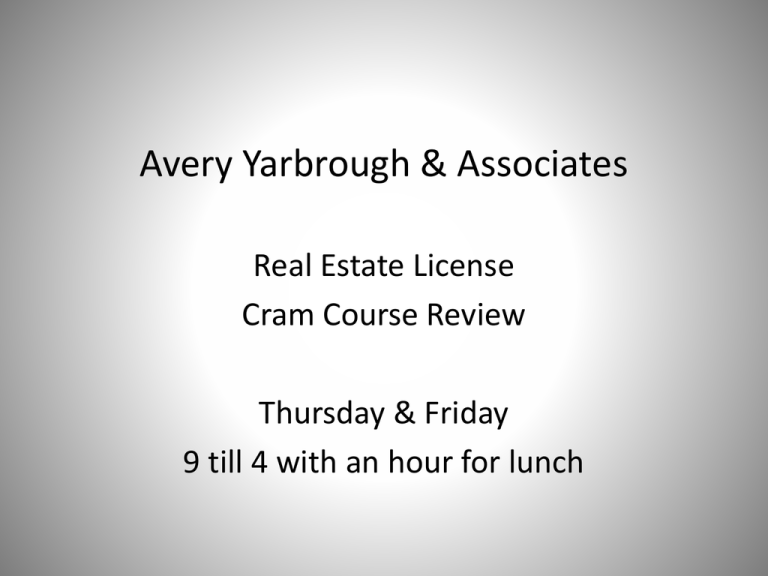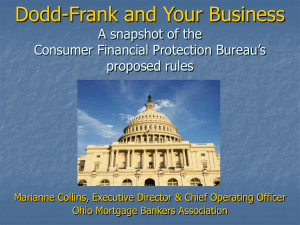
Avery Yarbrough & Associates
Real Estate License
Cram Course Review
Thursday & Friday
9 till 4 with an hour for lunch
• House Keeping Rules
• Cell Phones -Off
• Computers - Off
• Breaks – each hour -Be back at 10 minutes
– Restrooms are in break room
– No smoking at front door – go to end of building
• Mindful of your classmates
– We have a lot of material to cover
– Hold questions till breaks
Welcome
– Everyone, classroom students, online, other schools
• Materials
– Green Book
– Law Booklet & Law Test
– Handout Packet
– Handouts
• We need your contact information
– Fill out at break
• Lots of different material to cover in 2 days
• Acres to Zoning
– Need to know about acres and zoning to pass test
– 140 questions – can miss 42 and still pass
– 100 general & 40 Alabama Law
– More than one answer may look right
• Test taking anxiety
– Think long, think wrong
• Analytical personalities think too hard
– Don’t read anything into question
• Any test you don’t study for will be hard
– 6 sections 100 Questions & 40 on Alabama law
1 Listing Property 31% of general knowledge test
2 Selling Property 21%
3 Property Management 14%
4 Settlement/ Transfer of Ownership 14%
5 Financing 10%
6 Professional Responsibilities 10%
Law is 28% of total test
– We will have lecture then short test
• Do better with this method
•
•
•
•
65% to &70% pass test on first try
Only about 60% online pass on first try
About 80% of our students pass on first try
Second test try – pass rates drop
– And drops even more on third try, only 20% pass
• Test should be difficult
– Dealing with important subjects
– Do it right the first time
• $71 per test
– It is important that you take this seriously
• Look at the packet on the right
• Outline of class
• Words – Know vocabulary
– Nerd Words on test
– Obscure words Reliction, Riparian, Reentry,
Remainderman, Recording, Range, Reconciliation,
Rectangular System, Redlining, Regression
• The way we studied as children is the way to learn
• Read, Study, Test
• Our other classes
– Post License, Broker, CE
• Test taking tips
– 80% of those that fail get between 65 to 69
– Only 1 point between success and failure
– Listen to lecture
• Make notes
•
•
•
•
Schedule a morning test
Anxiety is less in AM – no time to worry
Brain sharper in AM
Review night before
– Eat fruit night before – brain food - 12 hours
• Don’t study past 9PM
• Go to sleep early and let your brain rest
• On the day of test
•
•
•
•
Get up early and be relaxed , not rushed
Don’t read paper or listen to news
Eat a good breakfast
No more studying
• Get to test site early –
– 15 minutes late and you can’t take test
• At test site
• Have photo ID and 1 more with signature
– Do practice questions on computer
– Maintain pace throughout exam
– Don’t wrestle with a question
– Read question twice
– Read answers twice
• You will know answer in your brain
• If you don’t know, then bookmark and move on
• Bookmark math and skip -- work them last
– DO NOT GO BACK AND CHANGE AN ANSWER
• Will usually get it wrong
• Finance has 10 questions
– Most students have trouble with real estate math
• We go over math, but don’t teach math
– We will help as much as you need
• Having Trouble?
– Call us for extra help – this is what we do
– No extra charge for this
– We want you to do well on the test
•
•
•
•
Power Point Handout is your Outline
Take notes on handout
Study them later
More important to listen to lecture
• Story about Finance
– Elementary concept
• 1934 Mortgage industry began under FDR
• Horrible economy – end of Depression
• Housing - the way to make economy grow
– 50% down payment at that time
• FHA created 3% down payment
– More likely to default
• Walk away if times get tough
• Insures lender
• FHA insures loans –
– Does not loan money or build homes
• FHA mortgage defaults - FHA pays
• FHA set maximum loan amounts
– People started buying homes
• Economy began to recover
– Lenders ran out of money
– What could they do?
•
•
•
•
Secondary market created to buy mortgages
Primary lenders sold pools of mortgages
Fanny Mae bought these mortgages
Primary lenders collected payments
– Escrow for taxes and insurance
– Service loan for a fee
– Lenders also charged closing cost to make money
• Origination, Discount, Service fee
• Fanny Mae sold mortgage backed securities to investors
• I950’s more buyers wanted a piece of the pie
– Private Mortgage Insurance – PMI
– 5% down payment on larger loans
•
•
•
•
•
•
•
Saving & Loan Banks needed secondary source
Freddie Mac created
Today they both buy the same loans
1960’s government realized it was in trouble
Turned into private companies
Didn’t want risky mortgages
Ginnie Mae came about to buy risky loans
– Government owned
– Guarantees loans
• 3 Financial Intermediaries
– Primary Lenders
• Institutional
Retail
Banker
– Loan their own money - Fiduciary
• Non- Institutional
Wholesale
Broker
– Loan money that is not their own
• Insurance companies and pension plans
– Have lots of money to invest
– Alabama retirement fund
• Mortgage Brokers
– Not their money
– Get it from non - institutional source
• They know someone who has money
• Insurers
– FHA , VA, PMI
• Secondary Market
• FAMA, FRMAC, GNMA
• Loan products
– Blanket Mortgage – think of a quilt with patches
• Developer buys land, puts lien on entire development
• When house is built on one parcel and sold
– Partial release clause – releases lien on that parcel (patch)
– Package Mortgage – Real and Personal property
• Includes Appliances, Furniture
• Popular at beach (condo and furniture)
• Farm Equipment
• Open end mortgage – Like credit card
– Leave mortgage open to add to in future
• Graduated payment mortgage (FHA245)
– Goes up about 5% each year for 5 years
• Negative Amortization
• Adds to principle – will owe more than borrowed for years
• Reverse Annuity Mortgage
– Senior Citizen gets check for part of equity each month
– Upon death, home is sold by family and debt paid
• Adjustable Rate Mortgage
• Protects lender from interest rate changes
– Changes Each year (up or down)
• Principle
• Plus
• Margin – profit to lender - Fixed during life of loan
• Plus
• Index- measure of change such as Consumer Price Index
– Cap per year/life 2/6
• Amortized Loan –Equal payments until note dies
– Also called - direct reduction loan - Includes:
• Principle – the amount borrowed
• Interest - Rate remains constant through life of loan
• Mortgage payment also will include:
– Escrow for Taxes & Insurance
– PITI Principle, Interest, Taxes, Insurance
– Interest is paid in arrears – ( at end of period when )
• Straight loan – pay (interest only) each year (rare)
– Loan would renew each year
• Pay off principle later
• Balloon – Amortized over 30 years, but
• Balance is paid off with a big lump payment at 5 years
• * Most owner financing is Balloon
• Acceleration Clause (like accelerator petal on car)
– Miss 3 payments and lender speeds up loan
• Foreclosure starts and borrower (mortgagor) has:
• Equitable Right of Redemption
– Pay off loan before foreclosure sale
• Statutory Right of Redemption
– Pay back loan plus cost of sale within one year
• Don’t ignore lender- work with them
– They don’t want the house
• Short Sale – Bank agrees to take less than owed
• Defeasance Clause
• Clause says lender must record satisfaction of mortgage
• Alienation Clause
• Clause says mortgage must be paid off at time of sale
– Acknowledgement = Notarize
• Necessary for recording
• Record in county where property located
• OR
– Gives
• EE
– Gets
• Confusing --- Mortgagor & Mortgagee
• Mortgage is a promise backed by security instrument
– Mortgagor (Borrower) gives promise to pay
– Mortgagee (Lender) gets promise
• Title Theory - Alabama
– Lender has legal title
– Borrower has equitable title
• Lien Theory
– Lender has equitable title
– Borrower has legal title
• Title record shows evidence of ownership
– Not a piece of paper
• Mortgages -- local Alabama custom
– Negotiable Instrument – will be sold
– Two parties
• Lender and borrower
• Trust Deed
– Three parties
• Trustor – Lender
• Trustee – Holds title
• Beneficiary -- Borrower
• Usury Law – Limits the amount of interest
charged
• Priority of liens first to record, first to collect
– Constructive notice (recorded)
– Actual notice (actual knowledge)
• Primary – gets first money from foreclosure
• Secondary – may not get any money
– Subordinate or junior
– Prefix sub- means beneath
• Alabama is a deficiency state
– Lender will get judgment claim against borrower
• Property taxes always have first priority
• Title
– Chain of ownership on property
– Marketable Title – 40 years – no challenges
• Seller makes promise to deliver marketable title
• Cloud on Title
– Break in chain of title
• Forgery
• Title Insurance – insures chain against defects
– Will have exclusions not covered – easements
– ALTA – unrecorded liens – materialman
• Points - 1 point is 1 % of loan
– Origination – Bank commission for selling loan
– Discount - % of upfront $ paid to reduce rate on loan
• Builder buy down for a couple of years
• Permanent buy-down for length of loan
• 1 point increases yield to bank about 1/8%
• Assumptions of Mortgage
– Rules vary by loan type
• Assume – Seller still responsible for debt
• Subject to – Seller not responsible for debt
• Novation – new note
• Owner Finance
– Purchase Money Mortgage 2nd Mortgage
• Purchaser has title
• Owner Finance
– Seller keeps legal title until paid off
•
•
•
•
Bond for title
Land sale contract
Contract of deed
Installment Contract
• FHA insures (% upfront + % each month)
– Ends when principle < 80% of original appraisal
• VA guarantees (government)
– CRV Certificate of reasonable value
• Same as appraisal
• Veteran must qualify & property must qualify
– Can substitute another’s guarantee
• Conventional – PMI (private mortgage insurance)
– On amount more than 80% of appraisal value
• Sale- Lease Back
– Owner needs money to expand operations
– Will sell building to investor and lease back
• Owner Finance
– Vendor - Seller (retains title)
– Vendee – Purchaser (gets equitable title)
• Test on page 146
– About an hour
– You must be comfortable with the way test is worded
– In front of green book are pages with confusing words
– Except, Not, Least, Best, Difference, Most Likely, ect.
• Put exam answers on separate page
– Later highlight correct answers to use as review
• Alabama License Law
• 40 of the 140 -- 29% of test
– Know the violations! Page 16 – 18
– AREC can suspend or revoke license
– Fines $100 to $2500
• Straight forward information – memorize
• Concepts of common law
• Know fees
• RECAD Real Estate Consumer Agency Disclosure
• 4 ways to have relationship with consumer
– Written disclosure to consumer to alleviate distrust
• Single Agent -- Agency with one party
• Limited Consensual Dual Agent --
work For - Advise
– Agency for both Seller & Buyer
• Transaction Broker -- Non Agency work With - Assist
• Sub-Agent -- Pre-RECAD way things worked
– All agents worked for the seller
• All relationships start as Transaction Broker
– Until:
• A written agreement is signed with consumer
• RECAD
• Must be presented at first contact with
consumer, before any confidential information
is disclosed to another
• Must be signed by agent and kept in file for 3 years
– Consumer not required to sign
• Keep all real estate contracts, listings, ect. for 3 Years
• Consumers are either:
• Customer NON-client / NON-Agent
– No advice
– Working With
– Transaction Broker
• Client - Agency Relationship
– Give Advice
– Working For
– Fiduciary
Agency Duties - Fiduciary
• Drive clients in OLD CAR
• Obedience - Obey lawful commands
• Loyalty - Put clients interest above your own
• Disclosure – Everything you know about transaction
• Confidentiality - Keep confidential information confidential
• Accounting – Account for all funds
• Reasonable Care – Use reasonable care
Customers – Non Agency – No fiduciary
Must answer their HARD?
•
•
•
•
•
Honesty
Accountable
Reasonable Care
Disclosure
? Questions must be answered truthfully
• Law Test
• Go over even # questions
• Answer on separate paper then later:
– Highlight correct answers to use as study guide
• Lunch 1 Hour – Please be back on time
• Nearby Restaurants
– Mexican – at end of this building
– Green Valley Drug Store – On down hill from here
– Subway - In parking lot across from Outback
– Salvador's - Next to Subway
– Golden Rule - Across Highway form Salvador’s
– McAlister’s - On Hwy on right ½ mile to the left
– McDonald’s - Just past McAlister’s
– Burger King Just before McAlister’s
– Chinese - Shopping center across from McAlister’s
– Krystal – Across from Burger King
• Review Alabama Law Test
• Know the violations!
• Easements
– Right of one person to use the property of another
– Necessity – was necessary to get to property
– Appurtenant – legally attached – runs with the land deeded
» Commercial easements in gross
» Utility easements look “gross”
– Prescription used for a length of time – 20 years
• Adverse Possession
– Servient tenement– Serves another property
– Dominant tenement – Property that benefits from easement
• Ingress & Egress from landlocked property
– Personal easement terminates upon death of either party
– Encroachment – Illegal extension on another’s property
• Life Estate – use for the life of a person
• Reversion – goes back to original grantor
• Remainderman – goes to another at termination
• In either case
– Can not waste property
– Can do anything else in bundle of rights UPEED
– All rights under life estate are limited by someone’s life
• Pur Autre Vie – Based on the life of another
• Deed – To transfer title
• Must have:
– In writing
– Identify parties and property
– Conveyance language
– Consideration – something for something
• Amount not necessary to state
– Grantor’s signature
• Grantee (buyer) signature not needed
– Must be delivered during grantor’s lifetime
• Condominium
– Fee simple (absolutely best ownership – all rights)
• Own interior of unit fee simple
• Own common area as tenants in common
– Swimming in the condo pool with the common people
– Developer must record condominium declaration
– Includes:
•
•
•
•
Legal Description
Bylaws
Covenants & Restrictions and bylaws
Survey
• Co-operative
– Apartment converted to ownership
– Building owned as a corporation
• Own stock in corporation
• May get loan to buy this stock, secured by lease
– Proprietary lease on apartment
• Co- ownership
– Joint Tenancy
(Husband and wife joined together at the arm PITT)
• Usually family
• Right of survivorship –
– At death interest goes to other party
• PITT Possession, Interest, Time, Title
• If ownership changes,
– PITT doesn’t change – new owner is a tenant in common
– Tenants in Common (In the condo pool with the common people)
•
•
•
•
Usually investment
Interest % may be different
If ownership changes nothing else changes
At death of owner, their ownership goes to heirs
• Community property - Not in Alabama
• Tenancy by the entirety – Not in Alabama
• Separate property bought before marriage stays separate
– Property may be bought separately during marriage
• Property inherited stays separate
• Obsolescence
– Economic – town is dying
• Not curable
– Functional - 6 bedroom, 1 bath (or an outhouse)
• Curable – can be fixed economically
• In-Curable – cost more to fix than is worth
• Methods for determining value
– Appraiser is a CSI investigator
• Cost – What it cost to build
– Special purpose - church
• Sales Comparison – what have other similar homes sold for
• Income – Income producing properties
– Capitalization rate = Net Income / Price
• Real Estate Agents perform:
– Comparative Market Analysis (using Sales Comparisons)
– May not call it an appraisal
Appraisals
• CIA doesn’t want CBS watching them
• Comparable Inferior Add
• Comparable Better Subtract
• Never adjust subject value, only comparable
– The comparable next door has an extra bedroom worth $10,000
– Adjust its sold price down to get the market value for your subject
• Cost approach –
– New construction, special purpose
– White House - cost approach (2008) $130,000,000
• Cost = Total of Materials + Land + Labor + Profit
– Reproduction Cost = exact duplicate
– Replacement Cost = similar
Your DNA
Adopt
• Capitalization Rate
– Rate investment will return
• GIVEN
• Gross Income – Vacancy – Expenses = Net Income
– Remember to change all #’s to annual
• Certificate of Occupancy
– All inspections have passed – ready to move in
• Legal Descriptions 3 methods
• Definition - A surveyor can find boundary of property
• Metes & Bounds - Plymouth Rock 1st monument
• Meters & Directions
– POB Point Of Beginning and around to starting point
• Rectangular Survey – government (Squares)
– Townships - 6 miles X 6 miles
– Sections – 1 mile square - 36 sections in a township
• Plat – Lot & Block - Recorded survey (subdivision)
– Must include, lot #, subdivision name, county & state
• Township tier starts at Tennessee line (Base Line)
– 6 miles south of Tennessee line is another line
• Running north and south every 6 miles are range lines
– Intersections of township & range lines are called
– Townships – these are 6 miles square
• Townships are numbered by where they are:
• First tier south of the Tennessee line is T1S
– T1S = Township 1 South
• The north and south lines, Called Range Lines
– start in Huntsville, so
– The first one west of Huntsville is R1W
R1W = Range 1 West
• Section is 640 Acres
¼ section has 160 acres
¼ of ¼ of ¼ has 10 acres
Acre 43,560 square feet -- 208.71’ X 208.71’
7 11 Ask at the 7-11 store about an acre
Mile is 5,280 feet
Oak Mountain is 5 miles down Highway 280
• Day 2
• Page 73 -- Property Management
• Property Manager (General Agent)
– Works FOR owner – fiduciary (agency) of owner
• Objectives
– Make money (return on investment)
– Maintain property
• Property Manager supervises
– Resident Manager
– Maintenance Manager
• Property Owner Must
– Provide Habitable Premises
– Provide Quite Enjoyment
• Eviction
– Actual Eviction –
• not paying rent
– Constructive eviction • Landlord doesn't provide habitable premise
– Not providing heat when needed
• Personal Property - personalty
– Not attached to real estate
– Ceiling fan in box
• Can move it around
• May become Real Property – appurtenant as a fixture
• Real Property
– Attached to property
– Ceiling fan attached to ceiling
• Buy seed at Lowes – personal property
• Plant seed & it becomes a tree – real property – appurtenant
• Fructus naturales (no annual cultivation) – tree
• Fructus industriales (emblements) - crops
• Cut tree (severance) – now personal property
• Processed into lumber – personal property - sold at Lowes
• Used to build house – becomes real property upon attachment
• Trade Fixtures
– Equipment to operate a business
• Big refrigerator, Stainless Steel sinks
• Attached, but not considered Real Property
– Must be removed before lease expires
• Damage must be repaired
• If not removed, becomes property of owner
Leases
• Estate for years or Tenancy for years
– It begins and it ends
• Period of time doesn’t matter
• 30 minutes or 30 days or 30 years
• Periodic Tenancy
– Period to Period – no ending date –
• Month to Month, Year to Year
• Requires 1 period notice to terminate
• Estate at will
– Understanding to stay for a while (At will)
• Verbal agreement – likely family or friend
• Estate at Sufferance
– Holdover Tenancy
– Tenant remains after lease expires
– If landlord accepts next months rent it becomes:
• Periodic Tenancy
Lease can be either Gross or Net
• Net lease charges tenant for following in addition to rent:
– Taxes, Insurance, Maintenance - TIM
• Gross lease includes TIM in payment
• Percentage lease also charges a percentage of sales
– Includes a fixed rate, plus
– A percentage of tenants sales over a set amount
• CAM - Common Area Maintenance
– Some net commercial leases may have CAM charge
Percentage Lease on 10,000 square foot store
• Base rent of $20 per Square Foot, plus
• 5% on store sales over $1,000,000
– What if Store sales are $1,500,000
• Base Rent per year is 10,000 X $20 = $200,000
• Plus 5% on sales over $1,000,000
• $1,500,000 -$1,000,000 = $500,000 X 5% = $25,000
• Rent = Base $200,000 + $25,000 = $225,000
• Monthly Rent $225,000 / 12 = $18,750
Commercial rental space is graded:
• A – New building in great location
• B - Older building in great location that has been rehabbed
• C - Older building, may not be in great location or condition
• D - Run down building
• Rent is charged per square foot per year
• Class A space may be $20 per square foot
• 1500 sf. X $20 X 12 months = $30,000 per year
– Monthly rent would be $2,500
• Statute of Frauds
– Contracts involving real estate must be in writing
• To be enforceable
– Except a lease less than one year, may be oral (parol)
• 20 years or more must be recorded in first year to be enforceable
• Maximum lease is 99 years
• Escalation Lease will be go up over time to cover increased cost
– Tied to an index (Consumer Price Index)
• Statute of Limitation
– Time limit to bring action
• Accounting reports
– Balance Sheet
• List Assets & Liabilities
– Profit & Loss
• List net profit after expenses
• Sub- lease
– Assignment of
• privilege of use
• Responsibility to pay rent
– Original tenant has a sandwich lease
• Novation
• Replaces agreement with another
Environmental Hazards
• Lead Paint (Written disclosure required- LPD)
– Must also give pamphlet about danger to family
– No lead paint used in residential built after 1978
• PCB – hazardous chemical in electrical transformers
• Radon – Decomposing soil builds up gas under home
– Colorless, Odorless, Gas Collects in home and may cause cancer
• Carbon Monoxide– Gas from using natural gas heat that may build up and kill you
• Asbestos – Cancer causing insulation
– Encapsulate – Seal it and leave it alone
Contract –
• Execute- to sign a contract
• Executed Contract is fulfilled – closed
• Offer & Acceptance
– Agreement to do or not do something
• Seller promises to deliver good title
• Buyer promises to pay money
Option
• Unilateral contract - One promise
– Right to buy a property for a period
– Optionor – person giving promise to sell
– Optioner – person may buy or not
• Gives money for right to buy
• Lease Purchase is 2 agreements:
– Lease
– Option
• May buy at end of lease or not
• Unilateral Contract
– One person has made promise
– Listing Agreement
• Bi- lateral
– Two parties have agreed to contract
– Sales Contract
• Contract - Must Have: COLA
– Consideration – Something for Something
• Valuable – Money or equivalent
• Good – Love & affection – Family situation
– Offer & Acceptance – Mutual, genuine assent
• Not under duress
– Legal
• Age
• Purpose
• Capacity
– Power of Attorney
– Agreement – set of promises
Legal remedies
• Breach of Contract
– One party to contract does not perform
• Aggrieved party
– Suit for damages
– Specific performance
• Contract date to close is a target date
– May be circumstances that prevent closing
• “Time is of the essence” means:
– All times MUST be adhered to, or breach occurs
• One may lose rights through “latches” (sleeping on rights)
• Inspection date missed – one week
Earnest Money is not required for a valid contract
– If earnest money is included
• Seller may accept earnest money as liquidated damages
– If contract breached by purchaser
– Money must be held in Escrow Account in
• An FDIC insured bank in Alabama
• Must be turned in to broker immediately
• Must be deposited in escrow account
• When offer becomes contract
– Offer (unilateral) becomes contract (bilateral)
– Unless contract states differently
• Money belongs to contract
• Creates equitable interest in property for purchaser
• Postdated check must be approved by seller
• Offer
– May be accepted by seller
• Becomes a bi-lateral ( 2 sided) contract
– May be rejected
• Offer dies
– May be countered
• If seller makes a mark other than signature
• This creates a new unilateral contract (counter-offer)
• Sometimes one party may put a time limit (by Friday @5)
• Bundle of Rights (Sticks in a bundle)
–UPEED
•
•
•
•
•
Use
Possession
Encumber
Exclude others
Disposition
– Subject to Government rights (PETE)
Zoning
(Primary Purpose is to protect the
health, safety and welfare of the public)
• RCA IS Zoning Districts
•
•
•
•
•
Residential
Commercial
Agricultural
Industrial
Special Purpose ( Hospital, Library, Church)
• Non Conforming Use (Zoning)
– Use that does not conform to surrounding properties
• Day care center in residential zoning
– Grandfather Clause
• Use that may continue when surrounding zoning changes
• Home on highway where commercial has expanded
– Variance
• A property owner needs to build on a lot that is too small
• Building Codes are not Zoning
– Set minimum standards for material & workmanship
Health & Safety - GFI plugs, ect.
• Ordinary Income
– Money for working
• Capital Gains
– Profit on gains from the sale of property or stocks
• Short term – owned less than a year
• Long term – owned more than a year
– Lower tax rates
• Income Deductions
– Depreciation
• Accounting Deduction per year of % of improvement
– Land does not depreciate
• Actual Depreciation – paint, roof
• 1031 Tax Exchange – will be handled by intermediary
– Tax code that allows the exchange of like property
• Income property for income property
– May not be even exchange
• One party may pay boot
– Money in addition to property – this money is taxed
• Securities (regulated by SEC)
– Stocks – ownership position in company
• REIT – Real Estate Investment Trust
– Colonial Properties is a REIT
– Get benefit of investment without management
• No say in management
– Securities sales requires a securities license
• Not a real estate sales license
• Interstate commerce (regulated by SEC)
– Regulated by federal government
• Intrastate commerce ( Alabama Blue Sky Law)
– Not regulated by federal government, but Alabama
Testament - Will
• Die leaving a will is Testate
• Die without a will is Intestate
– State Statute of Descent and Distribution
– State law determines how property is distributed
• Die without heirs
– Escheat = State get property ( One of PETE power)
• Will must be written to transfer interest in RE
• Devise
– Gift of real property by will
• Bequeath – Bouquet
– Gift of personal property by will
• Legacy
– Gift of money by will
• Government Powers
• PETE works for the government
•
•
•
•
Police - Zoning is one police power
Eminent Domain (right), Condemnation (Process)
Taxation
Escheat - Person dies without heirs or will
Restrictions on use of property
• Private restrictions – CC&R
– Covenants –
•
•
•
•
To maintain uniformity – homogeneity
ARC - Architectural Review Committee must approve
Mailbox, color of house, trees
May be forced to conform
– Can not take owners property under covenants
– Fee Simple Defeasible (Defeatable)
– Conditions –
• Restricts use of future owner
– Previous owner may have future rights
– Conditions Subsequent
• New owner must not perform some action (sell alcohol)
– Former owner retains “right of reentry” if condition is broken
– Must go through courts
– Fee Simple Determinable - Special Limitations
• Estate ends automatically due to violation of limitation
– “Possibility of Reverter”
– No court action required
• Deeds
– Warranty against title defects
• Could have been issues in past that affect title
• General Warranty Deed or Warranty Deed
– Bumper to Bumper warranty on car
– If there is a issue against title in future it will be fixed
• Special or Statutory Warranty Deed
– Limits to warranty
– Covers issues that may have happened during
grantor’s ownership of property
• Quit Claim – no warranty
– As is
– Used to quiet a cloud on title
• Title Insurance
– Protects against something in the past
• Different from other insurance that protects against event in future
– One time premium
• Opinion of Title – Attorney does Abstract
– Checks the chain of title – no warranty
– Will not know about unrecorded liens
– Will not know about forgery
Liens
• Voluntary Lien
– Owner ask for it - Mortgage
• Involuntary Lien
– Owner didn’t ask for it – Property tax lien
• Specific
– Lien on a specific piece of property
• General
– Lien on all property, personal and real of a person
• RESPA Real Estate Settlement & Procedures Act
–
–
–
–
–
–
–
1 to 4 unit family residential property
Federally related loan
Must use HUD1 form (24 hours before closing)
Required Good Faith Estimate (GFE) within 3 days
No Steering
No Kickbacks
Maximum 2 months escrow for taxes and insurance
• Fair Credit Act (truth in lending) Regulation Z
– Disclose the APR ( true annual percentage rate )
– Truth in Advertising - Trigger words are %, payment
– 3 day right of recession on junior mortgages
• Debits are bad
– Debt owed
– Takes money away
• Credits are good
– Credit to an account
Important Dates
• Civil Rights Act 1866
– Prohibits discrimination based on race
• Civil Rights Act 1968 – Expands protected classes
• Fair Housing Act of 1988
– Protects FRESH CORN
– E&O insurance doesn’t cover, Equal Opportunity
• Familial, Race, Sex, Handicap, Color, Religion, National Origin
• Doesn’t protect age
• Handicap includes physical and mental
– Includes AIDS
– Includes recovering addicts
• Redlining
– Insurance or Lender draws a red line around an
area and refuses to do business there
• Steering
– Pushing people to a certain area
• Catholics to a Catholic neighborhood
• Blockbusting
– Telling people they need to move because a
protected class is moving into the area and the
property values are going to fall
• Can discriminate if:
– Owns a 4 plex or less and lives in one unit
– Owns less than 3 homes
– Churches can discriminate based on religion
• Can not advertise the discrimination
• Race discrimination is never allowed
• Handicap reasonable accommodations must be made
– May require tenant return to original condition
• Exempt
– Churches – Membership may not discriminate
– Housing for older persons
• 62 or older
• 80% must be over 55
• ADA Americans with Disability Act
– Must make reasonable accommodations
• Assigned Handicap spot near door
• Service animals in a no pet building
– May require premises to be returned to original
•
•
•
•
•
Fair Credit Act
Most of FRESH CORN
Protects Marital Status instead of Familial
No Age discrimination
Includes dependence on public assistance
• Independent Contractor
– Employer doesn’t have to
• Pay Social Security Tax
– Employer May not:
– Dictate hours worked
– Dictate how work is to be done
• 90% of compensation must come from
commissions and not hours worked
• Anti-Trust Prohibits (Sherman Act)
– Allocation of markets
– Price Fixing (or even taking about it between competitors)
– Group Boycotting
• Broker may:
– Set commission rate of office
– Set commission splits
• Can a seller refuse to accept a full price offer?
– Yes
– But, broker has earned commission
• Delivered a ready, willing, able buyer
– Show License
– Show permission to sell – Listing agreement
– Show to be procuring cause
• Progression
– Home price is positively affected by nice new
homes around it
• Regression
– Home price is negatively affected by run down
homes around it
• Federal Reserve Policy controls interest rates
– Selling Bonds Takes cash out of the system
• Causing interest rates to increase due to less supply of money
– Due to Supply and Demand of money
– Buying Bonds Puts cash into the system
• Causing interest rates to drop because there is more money
– Reserve Requirements
• Banks must hold a percentage of cash in reserve
• More reserve requirement means less money in circulation
– More demand for money increases interest rates
– Discount Points – Rates banks charge each other
• Higher rates mean less money to lend –
– Means higher demand and higher interest rates
Any Questions?










